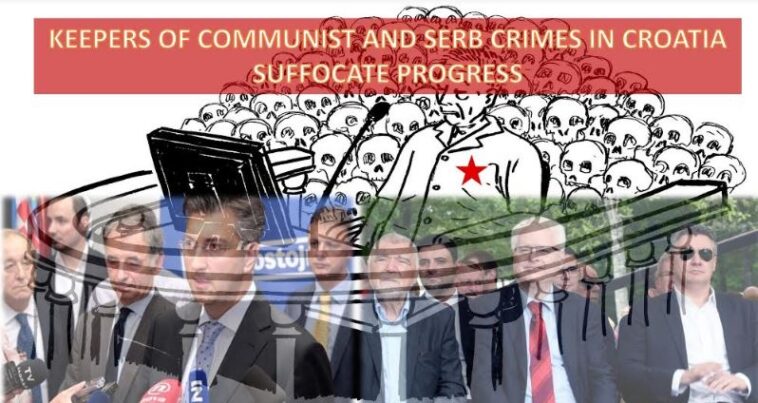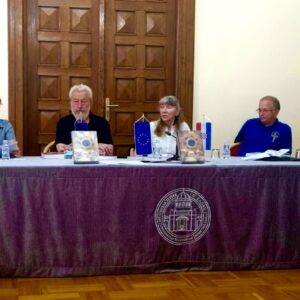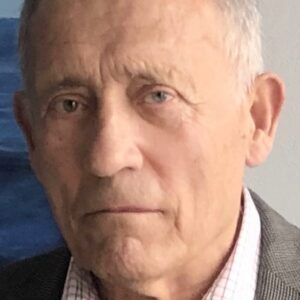Croatia is surely one of the most fertile grounds in the world for historians, political analysts, social psychologists, and those in fervent pursuits of truth to study and stand back cringing in disgust at the open and palpable tactics utilised by former communists (under the mask of antifascism) in the prostitution of transition from a totalitarian regime into a democratic one. If we adopt the position of labelling the hiding or desecrating the truth about crimes committed as a wicked act (if not criminal), then the coalition of Croatian HDZ and SDP governments in the past decade or so with the SDSS Serb minority in parliament reminds us of a joint wicked enterprise. A kind of a political joint wicked enterprise that strips the dignity off the defender of Croatia from brutal aggression. The joint wicked enterprise whose task manifests itself in the hiding, in the twisting, in the distorting of truth of countless crimes perpetrated by Yugoslav communists/Partisans against the Croatian people seeking independence in both World War II and by Serbs in the Croatian Homeland War of 1990’s as well as in Bosnia and Herzegovina.
A normal, compassionate government would not even contemplate on forming a coalition with those who attacked its people from inside, like rebel Serbs living in Croatia at the time and their family members, joined in these crimes by Serbs from Serbia. A normal government of Croatia would know what it meant for its democracy-loving people in early 1990’s when the Serbs engaged in relentless and brutal campaigns of ethnic cleansing, expelling Croats (in Croatia and Bosnia and Herzegovina) and other non-Serbs from their homes, wreaking mass murder, rape, torture and devastation.
This type of government coalition is much about blaming the victim – freedom loving Croat in this case – and justifying or shutting a blind eye at mass crimes perpetrated by communist Yugoslavia partisans during WWII and after it, as well as multitude of those committed by communist Yugoslavia nostalgics during the 1990’s war of Serb aggression. This type of government by participating in and tolerating such distortions and belittling of the historical truth of the territories populated by communist agendas and the agenda of Greater Serbia stifle and suffocate true democracy. It is in their interests to do so, otherwise the acknowledgement of communist crimes for the depravity they represent would sink them utterly and completely into the garbage bin of history, where they belong. The pursuits of secession from communist Yugoslavia in Croatia and Bosnia and Herzegovina during 1990’s aimed to achieve exactly that: dump communism and its totalitarian regime into the garbage bin of history. While these pursuits were successful militarily and with heroic gumption of Croatian independence fighters, they encountered monumental failures after the War ended. The communist mindset grew wings in its efforts to redeem the unredeemable monstrosities of Yugoslav communists and their Serb echelons. Anyone attempting to show the truth, to research the truth, to lift Croatia where it should have been decades ago after the Homeland War ended, well rid of the communist mindset and its stinking corrupt heritage, finds himself, or herself, labelled revisionist and still fighting for dignity of the good fight it fought when seceding by the will of the people from communist Yugoslavia.
Given that such government coalition in Croatia has also scooped under its wings the mainstream media, the truth and horror of Yugoslav communist crimes in Croatia and Bosnia and Herzegovina, of Serb-perpetrated crimes, suffers deeply. It’s difficult to say how long the truth-loving people will need to keep investing their energy in disputing the communist filthy mantra that communists liberated Croatia in 1945 and showing-up Serb denials of depravities they committed against Croats during 1990’s. The strong communist mindset thriving within such government coalition in Croatia has placed often insurmountable barriers on the road of achieving full and functional democracy since the Homeland War ended completely in late 1990’s.
The month of July is as telling as any month of the year where we see examples of such despicable approaches to historical truths.
The historical village of Srb belongs to the Boricevac parish in Croatia that in Spring of 1941 saw, at the hands of communist partisans, great human and property suffering and destruction of Croats. Their houses, church, parish residence, were burned and destroyed. All the Catholic faithful of this parish, about two thousand of them, had to leave their centuries-old homes, and unfortunately, to this day, their descendants have not realised the right of return. The inhabitants of the village of Ivezici, 37 of them, failed to escape and all were murdered and thrown into a pit, near Brotnja, on Dabin peak. In 2017 their exhumation was carried out and they were buried in the Catholic cemetery in Boricevac. And yet, one will not find this historical truth in any Croatian mainstream media. What one will find there in relation to the historical village of Srb is the Serbian National Council of Croatia, supported by the government, holding a commemoration dedicated to the so-called first antifascist uprising (against the fight for independent Croatia). The fact that horrific crimes were committed by anti-fascists against local Croats during the uprising is not mentioned anywhere where the Croatian Serbs in coalition with the government have a say. The pure truth is not a pastime the so-called antifascists of Croatia have any time or will for.
A sad state of affairs in Croatia, indeed!
This day (24 July) in 1992, the village of Brisevo in the municipality of Prijedor, became a torture and hell for the Croatian people, wrote retired General and former Member of Croatian Parliament, Zeljko Glasnovic, on his Facebook page last week, 67 Croats were brutally killed. Everyone to the last was a civilian. The Serbs beat the killed Croats to exhaustion, cut the tendons on their arms and legs with knives, cut off their flesh from their bodies, slaughtered them, stabbed them in the body, cut off their noses, ears, genitals, ripped their bellies, broke their ribs, bludgeoned them with clubs and hoes, forced mothers, wives and children to observe the brutality and abuse of men after which women and girls were raped. You will not hear about this monstrous crime in the Croatian media. Brisevo has never existed for the Croatian media! For, the people need to be kept in ignorance, in guilt and obedience of every kind. This is the testimony of one girl (Helena Komljen, from the book on Brisevo victims by Frano Pilipovic and Ivo Atlija) who survived this horrific massacre:
“I was 13 and I remember everything well. I know we couldn’t escape anywhere, we had to stay at home and wait for our fate. As a child, I didn’t understand it all, although I used to hear Mum and Dad talk so I was scared I was also afraid that the infantry would destroy and kill us all, and I had no idea what infantry was. I thought about how we could hide and run away somewhere, although all that when I think about it now was impossible. So, the days passed in fear that some grenade may hit us, because they also shelled us sometimes as well. Then came the worst day of my life, July 24, 1992, when I was left without everything by Serbian soldiers. No family, no friends, no childhood. Only my little brother was left with me. I don’t know what it would be like if he wasn’t with me afterwards. It was morning and we all got up, Nedo Mlinar passed by our house and told us that we had to hang a white sheet on the house and that no one would touch those houses. It was then that all of us with white sheets perished. Everything was the other way around.
Around 12 o’clock, exactly what we were all afraid of – happened; the infantry entered the village. We were in the house when they threw a Zolja rocket on the roof, I was in the bathroom, I could only feel the pieces of the ceiling falling on me and the dust and hissing in my ears. We all ran outside in panic to hide in our grandparents’ basement because we didn’t have a basement in our house. My brother managed to run to my grandparents, my mum and dad managed to hide under our house, and I stayed in the middle, neither here nor there. They started firing at me in bursts, I saw bullets near my feet crashing into the ground and raising dust, cutting down plum branches and then suddenly, I fell. As I fell bullets flew over me. God was with me and saved me, that’s what I felt then. Dad thought I was hit, he called me from the side and when he saw me looking at him, he told me to get up abruptly and run to them as fast as I could. That’s what I did, and they didn’t shoot then. Then they called from above from the hill that we should all come to them otherwise they would come and kill us all, even the children they emphasised. Then my dad said, there’s no life here anymore. And of course, to save ourselves since we couldn’t escape anywhere, we went to them.
My dad immediately recognised a man who went to school with him, told him you could have killed my daughter. The same man and a few others took my dad, my grandpa and my uncle somewhere. My grandmother, mum, brother and I stayed there with the others. There were about 20 of them on that road. Grandma told them she would bring them food and water and they told her she was talking too much and that she wanted to poison them. Then one completely young man, maybe 16 years old, came to me and played with a knife in front of my face. Grandma said nothing more, she was afraid he might kill me. I was in shock, I no longer felt or feared, I didn’t care, like in a movie, in fog and I don’t know where. We were all silent, mum was holding my brother and me and grandma were sitting next to each other on the ground. Then again one of the Serb soldiers started shooting near my ear in the direction of the forest. Mum and grandma begged him, don’t, then one came to mum and said, ‘how about we kill your son, he will kill us when he grows up.’ She told them in a sad voice, don’t please, he won’t kill anyone. At that moment, 4 or 5 of them were returning, taking my dad, grandad and uncle, bloodied pants, and shoes. When grandma saw that she just cried and told her my kids are dead. They came and showed us their legs how they were wounded, how the Ustashas wounded them and that the blood on them was from the Ustashas. I will never forget my grandmother’s and mother’s face, that fear and that sadness, and they kept silent because every word could mean death for them.
They told us to go to the weekend cottage nearby. As we were going up the one that killed my dad, grandpa and uncle said grandma stays because she talked a lot. We went on and entered the cottage. After 5 minutes two shots were heard. At that moment, I felt that my grandmother was dead. Mum looked at me and that look of hers full of fear confirmed once again that grandma was dead. She was holding my brother in front of her, and I was about 2 meters away from her. They told my brother to come to me and my brother came to me. Then, a Serbian soldier slapped my mother across the face and told her that she was a whore and that she was giving birth to Ustashas. Then, I noticed right across from me one person I knew, it was M.I., and I was hoping he could help us. I begged him with my eyes to do something or say something, but he just kept quiet. Even in his eyes there was fear. He later told me that he tried to tell a soldier, but he told him to keep quiet, otherwise he would kill him if he tried to save someone. Then they told my brother and me that we had to get out of the cottage because a soldier was waiting for us on the main road to take us to the command. We went out and I thought it was our turn now. The one who said that to us came out with us, drew his gun, and told us to run. We did that, we ran lightly, waiting for the bullet to pierce our backs, but it didn’t fire. Good luck again and God’s help. As we moved running like that, we passed our grandmother lying dead on her back, her arms folded beside her head as if praying to God. Blood was still dripping from her forehead, her eyes closed as if asleep. My grandmother, whom I loved the most in the world and without whom I could not sleep a single night, now I look at her dead in that worst way. We passed by that too and down the road a man was waiting for us. He told us sadly, oh dear children this is a war, and I will take you to safety to the command. I don’t know who that man was, I never saw him again. We went that way and then he left us with Dule in the command. So, it was a command for them.
They kept us in the attic for a few days to survive somehow, gave us food and water. There were, I don’t know anymore, exactly, maybe about 15 people. I just cried and cried day and night. In order for a group of Serb soldiers to pass, they would enter the house near Dule, and they wanted to inspect the whole house in case anyone hid. As for my mother, she was left alone in the cottage, she was taken back with 4 soldiers to the house, they raped her, bit her, tore pieces of flesh from her chest and then took her out from under the house and shot her in the head. Everyone heard her cries and moans. A few days later, my mum was buried by her brother himself and he confirmed it all. Later, my brother and I were in Ljubija with Ned Dimac and Nada and their children. They helped us a lot, they fed us and took care of us for 2 months, for sure. After that, my brother and I went to Croatia by bus. It was very difficult, years of fear and bad dreams, a big black hole in my heart and a broken childhood.”




